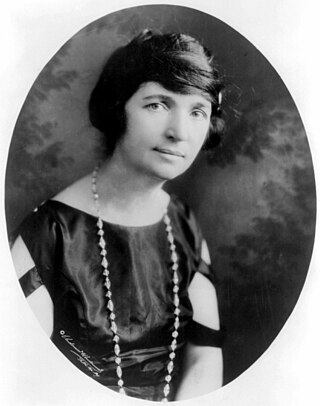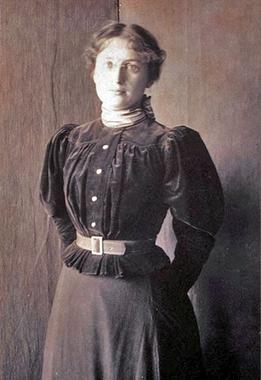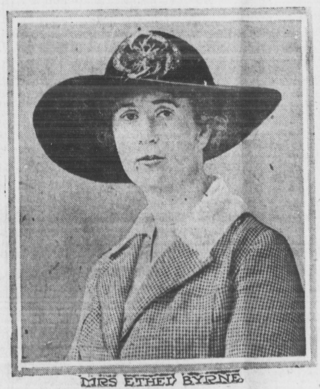
Margaret Higgins Sanger, also known as Margaret Sanger Slee, was an American birth control activist, sex educator, writer, and nurse. Sanger popularized the term "birth control", opened the first birth control clinic in the United States, and established organizations that evolved into the Planned Parenthood Federation of America.

The Comstock laws are a set of federal acts passed by the United States Congress under the Grant administration along with related state laws. The "parent" act was passed on March 3, 1873, as the Act for the Suppression of Trade in, and Circulation of, Obscene Literature and Articles of Immoral Use. This Act criminalized any use of the U.S. Postal Service to send any of the following items: obscenity, contraceptives, abortifacients, sex toys, personal letters with any sexual content or information, or any information regarding the above items.
The Planned Parenthood Federation of America, Inc. (PPFA), or simply Planned Parenthood, is a 501(c)(3) nonprofit organization that provides reproductive and sexual healthcare, and sexual education in the United States and globally. It is a member of the International Planned Parenthood Federation (IPPF).

Mary Coffin Ware Dennett was an American women's rights activist, pacifist, homeopathic advocate, and pioneer in the areas of birth control, sex education, and women's suffrage. She co-founded the National Birth Control League in 1915 together with Jessie Ashley and Clara Gruening Stillman. She founded the Voluntary Parenthood League, served in the National American Women's Suffrage Association, co-founded the Twilight Sleep Association, and wrote a famous pamphlet on sex education and birth control. A famous legal case against her eventually became the catalyst for overturning the Comstock laws.
The American Birth Control League (ABCL) was founded by Margaret Sanger in 1921 at the First American Birth Control Conference in New York City. The organization promoted the founding of birth control clinics and encouraged women to control their own fertility. In 1942, the league became the Planned Parenthood Federation of America.

Mary Steichen Calderone was an American physician, author, public speaker, and public health advocate for reproductive rights and sex education.

Birth control, also known as contraception, anticonception, and fertility control, is the use of methods or devices to prevent unintended pregnancy. Birth control has been used since ancient times, but effective and safe methods of birth control only became available in the 20th century. Planning, making available, and using human birth control is called family planning. Some cultures limit or discourage access to birth control because they consider it to be morally, religiously, or politically undesirable.

Maafa 21: Black Genocide in 21st Century America is an anti-abortion documentary film produced by anti-abortion activist Mark Crutcher in 2009. The film, which has been enthusiastically received by anti-abortion activists, argues that the modern-day prevalence of abortion among African Americans is rooted in an attempted genocide or the maafa of black people. The film is part of an anti-abortion, anti-birth control campaign aimed at African Americans.

Eugenics, the set of beliefs and practices which aims at improving the genetic quality of the human population, played a significant role in the history and culture of the United States from the late 19th century into the mid-20th century. The cause became increasingly promoted by intellectuals of the Progressive Era.

Katharine Martha Houghton Hepburn was an American feminist social reformer and a leader of the suffrage movement in the United States. Hepburn served as president of the Connecticut Woman Suffrage Association before joining the National Woman's Party. In 1923 Hepburn formed the Connecticut Branch of the American Birth Control League with two of her friends, Mrs. George Day and Mrs. M. Toscan Bennett. She was the mother and namesake of actress Katharine Hepburn and the grandmother and namesake of actress Katharine Houghton.

The Margaret Sanger Award was an honor awarded annually by the Planned Parenthood Federation of America from 1966 to 2015. Created to honor the legacy of Margaret Sanger, the founder of Planned Parenthood, it is the Federation's highest honor. It is given to individuals to recognize excellence and leadership in the reproductive health and rights movement. Although it is identified as an annual award, it hasn't been given out and since 2015.

The birth control movement in the United States was a social reform campaign beginning in 1914 that aimed to increase the availability of contraception in the U.S. through education and legalization. The movement began in 1914 when a group of political radicals in New York City, led by Emma Goldman, Mary Dennett, and Margaret Sanger, became concerned about the hardships that childbirth and self-induced abortions brought to low-income women. Since contraception was considered to be obscene at the time, the activists targeted the Comstock laws, which prohibited distribution of any "obscene, lewd, and/or lascivious" materials through the mail. Hoping to provoke a favorable legal decision, Sanger deliberately broke the law by distributing The Woman Rebel, a newsletter containing a discussion of contraception. In 1916, Sanger opened the first birth control clinic in the United States, but the clinic was immediately shut down by police, and Sanger was sentenced to 30 days in jail.

Birth control in the United States is available in many forms. Some of the forms available at drugstores and some retail stores are male condoms, female condoms, sponges, spermicides, and over-the-counter emergency contraception. Forms available at pharmacies with a doctor's prescription or at doctor's offices are oral contraceptive pills, patches, vaginal rings, diaphragms, shots/injections, cervical caps, implantable rods, and intrauterine devices (IUDs). Sterilization procedures, including tubal ligations and vasectomies, are also performed.
The Voluntary Parenthood League (VPL) was an organization that advocated for contraception during the birth control movement in the United States. The VPL was founded in 1919 by Mary Dennett. The VPL was a rival organization to Margaret Sanger's American Birth Control League. The VPL lobbied to change anti-contraception laws. In 1925 the VPL merged with the American Birth Control League.

The Clinical Research Bureau was the first legal birth control clinic in the United States, and quickly grew into the leading contraceptive research center in the world. The CRB operated under numerous names and parent organizations from 1923 to 1974, providing birth control and infertility clinical services to thousands of patients, and serving as a site for medical research and education on these topics.
The history of birth control, also known as contraception and fertility control, refers to the methods or devices that have been historically used to prevent pregnancy. Planning and provision of birth control is called family planning. In some times and cultures, abortion had none of the stigma which it has today, making birth control less important.
Heterodoxy was the name adopted by a feminist debating group in Greenwich Village, New York City, in the early 20th century. It was notable for providing a forum for the development of more radical conceptions of feminism than the suffrage and women's club movements of the time. The heterodoxy club was also known to be a space filled with people living remarkably diverse personal lives, allowing for women to congregate and talk about their experiences with one another in what was considered to be a safe space for conversation and change. The group was considered important in the origins of American feminism.

Ethel Byrne was an American Progressive Era radical feminist. She was the younger sister of birth control activist Margaret Sanger, and assisted her in this work.

Edna Bertha Rankin McKinnon was an American social activist for birth control. She was the executive director of the Chicago Planned Parenthood chapter.
Florence Rose was an American birth control activist, perhaps best known for serving as the secretary of Margaret Sanger for more than a decade.













